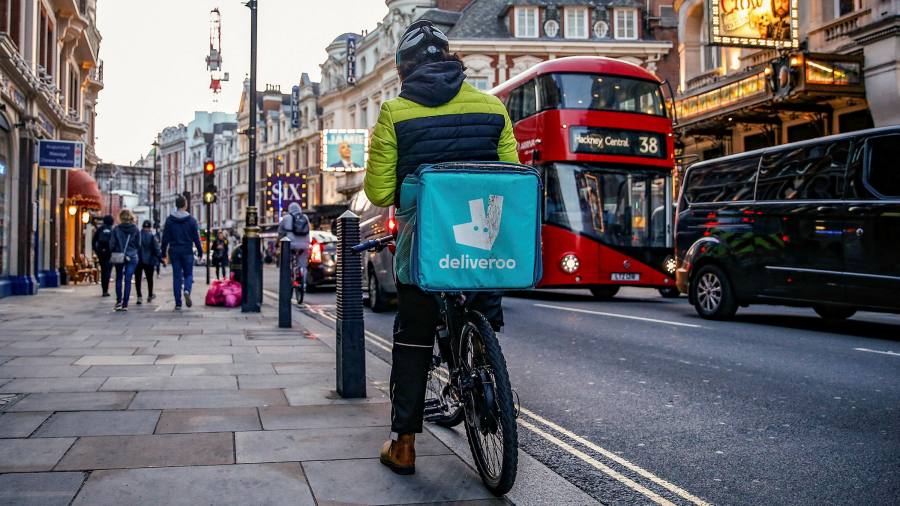[ad_1]
The City’s future will be delivered by bicycle. It may not match what was ordered.
Deliveroo on Thursday made formal its promise to float in London. The Hill review of listings rules prompted the courier dispatch service to add a preamble to its intention to float statement, expected early next week. Lord Jonathan Hill gave Deliveroo’s politically savvy spin team a quote for the media blitz, as did Oliver Dowden MP and London Stock Exchange chief executive David Schwimmer. Looser rules, they all agreed, make London a more attractive destination for technology champions.
There’s a reason this looks like lobbying. Deliveroo founder Will Shu intends to retain control of the group, so his float will involve a two-tier shareholder structure. Under current rules, that means a standard listing and FTSE index exclusion. Investors will be offered the insurance policy of a three-year sunset clause, meaning premium status can still be secured even if the relaxed attitude to dual-class ownership never becomes law. It’s a clause Shu won’t want triggered.
The Deliveroo camp has been vague about potential valuations. Optimism runs as high as $10bn, with the floor provided by a fundraising agreed in January that put the headline value at just over $7bn. The success of online retailer THG — up 40 per cent since its standard-grade float in September — provides a useful benchmark for founder-controlled businesses.
But THG is a different proposition. Whereas its profitability is proven, Deliveroo is a cash-burning machine. Its accounts show losses of £133m in 2016, £199m in 2017, £231m in 2018 and £318m in 2019. Lockdowns perked up performance — the January fundraising preceded six months of operating profitability, according to Shu — but only after an early wobble that convinced the Competition and Markets Authority in April last year to show charity to what it called a “failing firmâ€.
Profitability rarely matters much in food delivery. Germany’s Delivery Hero and DoorDash in the US both have stratospheric valuations and conceptual business plans where any route to profitability requires competitors to fail. What helps them is that ownership across the sector is a web of interconnections. All the main owners appear to apply the same strategy of securing market leadership or exiting.
Deliveroo is different. It was once considered a weak competitor, until Covid-19 came to lift all boats. It was once an acquisition target for any operator keen on tidying up an overly competitive UK market, until Amazon last year bought a 16 per cent blocking stake that can only be increased with CMA approval.
Now it’s a British tech champion, using pandemic-inflated metrics to give existing backers an exit opportunity and raise yet more cash to burn in search of a functional business model. Those rushing to celebrate its choice of IPO venue as a victory for regulatory liberalism might soon wish they had waited to see exactly what’s inside the box.
B&M’s no bargain
Investors have been filling baskets with B&M shares almost as fast as shoppers at the discount retailer have been stocking up on home essentials, writes Andrew Whiffin.
Stockpiling and lockdown demand helped propel the stock into the FTSE 100 index last year, but Thursday marked a crucial hurdle. In a fifth and likely final unscheduled trading update in the year to March, B&M said earnings before interest, taxes, depreciation and amortisation would be £50m higher than it previously expected. The positive news was overshadowed by caution that the group’s final month would be up against tough comparisons from last year’s March spike in panic buying.Â
The short period of uncertainty will help determine whether a good year for the retailer was a blip or part of a longer lasting trend. B&M estimated new customers in June accounted for almost a quarter of shoppers. A strong March would offer an indication that these B&M converts can become regulars. Shares trading at 17 times two-year forward earnings — the top of their recent valuation range — need signs of permanent market share gains to continue their upward journey.
The benefits of 2020 have flowed directly to shareholders, the largest being the holding company of the founding Arora brothers, with an 11 per cent stake. Special dividends of £600m in the past year push total returns to almost 60 per cent since the start of 2020, eclipsing the flat returns of the dominant UK grocers.Â
Bulk buying for lockdowns is just one way the pandemic helped the group. Like-for-like sales growth of almost a quarter in the six months to September was supported by a higher mix of merchandise trade. Housebound consumers bought more DIY and gardening equipment helping to boost profit margins.
Ebitda in the first half of the year doubled while margins gained almost 5 percentage points, hitting 13.3 per cent. This is expected to ease in the coming year as one-off sales drop out of the numbers. Analysts’ consensus estimates for 2021/22 are at present about a tenth below those for the current year.Â
B&M has been one of the biggest beneficiaries of harsh UK lockdowns that have left consumers bored, homebound and cash rich. As vaccine rollouts hasten a return to normal, that trade remains exposed.
Deliveroo: bryce.elder@ft.com
B&M: andrew.whiffin@ft.com
[ad_2]
Source link





